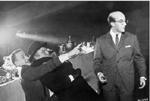DROP IT. The big one—you remember, back when we were facing nuclear annihilation during the Cold War? Who’d have thought that we’d be nostalgic for that fear-filled time? But today, in Kubrick’s classic 1964 A-bomb farce, the apocalypse never felt so good. Even without its Kruschev-era payload of anxiety (displaced into explosive laughter), the movie still soars as pure, venomous apolitical comedy. Every character’s a type; no one is redeemable, and the world itself hardly seems worth saving (or mourning)—yet Strangelove‘s dark satire has never been funnier.
DR. STRANGELOVE directed by Stanley Kubrick with Peter Sellers, George C. Scott, Sterling Hayden, and Slim Pickens runs December 24-30 at Varsity
Death has been kind to Kubrick in 1999, providing a marketing boost for his inert Eyes Wide Shut and prompting effusive praise. Yet in 1964 he was still free of the burden of genius, collaborating with Terry Southern on Strangelove‘s script, which relates how a rogue general (Sterling Hayden) launches an attack wave of B-52s to wipe out Russia—a country which, we learn, has a retaliatory doomsday machine that will in turn destroy the world.
Comedy doesn’t get any purer than that: Intentions—for good or evil—have their opposite effect. Our meek president (Sellers) only hastens war with his pacifism. Lionel Mandrake (Sellers again) ends up feeding ammo to Hayden’s general instead of stopping him. And in the sole remaining B-52, the resourceful bomber crew led by pilot Slim Pickens perseveres on its glorious flight—in a backhanded celebration of all the courage and determination that makes our country great. And we’re rooting for them the entire way.
Kubrick’s famous image of cowboy actor Pickens whooping and hollering astride the bomb plummeting to ground zero has now become an indelible part of film history. It’s like Marilyn’s dress or King Kong on the Empire State Building, where the nutty longings of an age congeal into an icon.
Known by its full title, Dr. Strangelove or: How I Learned to Stop Worrying and Love the Bomb may not be Kubrick’s best film, but many people cite it as their favorite in a career that later became increasingly cool, clinical, and humorless. In a revealing New Yorker article this year, a screenwriter who worked on Eyes Wide Shut noted how Kubrick systematically removed each collaborator’s contributions so the screenplay would be his alone.
Thanks to Terry Southern, however, this tendency was denied in Strangelove. In Southern’s 1995 New York Times obituary, he was quoted as saying, “The important thing in writing is the capacity to astonish. Not shock—shock is a worn-out word—but astonish. The world has no grounds whatever for complacency. Where you find smugness, you find something worth blasting. I want to blast it.” And oh, how he did.








